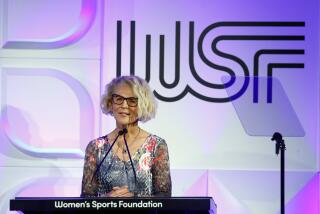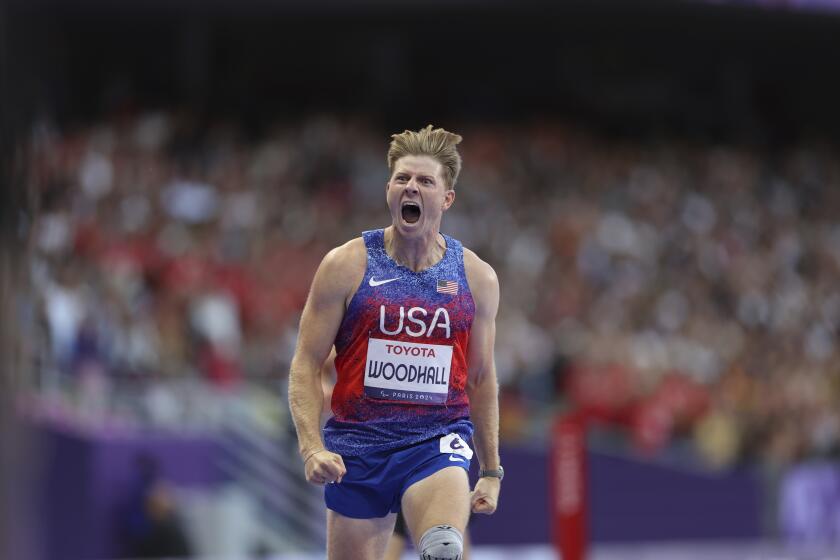Granger’s Olympic Dream About to Become Reality
The strangest place wasn’t the warehouse.
Sure, Michele Granger had to fling softballs while forklifts moved furniture around her. But one has to accept a little inconvenience when living in Alaska and training for the 1996 Olympics.
Nor was that parking garage particularly odd.
Yeah it got cold there, real cold. But that’s Anchorage in the winter.
Even the snow-blind she called a backyard wasn’t peculiar.
Granger, the former Valencia High School and California star, was forced to carve a ditch to pitch--with the snow piled above her head. But she just “had to” throw outside before joining the Olympic team in its warm and cozy softball compound in Columbus, Ga.
“I’ve been very creative,” Granger said. “I had to be.”
But the day Granger pitched in church, that’s when training became a bit surreal.
“I had just stopped throwing and was putting my [pitching] net away,” Granger said. “I turned around and saw this bulletin board. On it, there was a note that read, ‘God Is Watching You.’ I thought I had better train a little more.”
Olympic softball, in Granger’s words, has taken its own sweet time getting here. So if she needed a divine reminder to push a little harder, well, that was OK.
This, after all, has been a carrot dangling for a decade; the one thing that kept her in the game. So finally, in 1996, Olympic softball was a reality and neither rain nor sleet nor snow was going to keep her from that appointed mound.
“I would have stopped playing after college if it hadn’t been for the Olympic rumor,” Granger said. “I thought it was going to happen in 1988, then in 1992. When I heard it was official for 1996, I didn’t believe it at first. I had heard it too many times. I called the Amateur Softball Assn. and they assured me it was true.
“At this point, I’m pretty darn glad I stuck it out.”
Some may argue that striking out batter after batter, while piling up no-hitters, is a little more than just sticking it out. At 26, she is hardly excess baggage.
And when Granger says she is not the same pitcher who set six NCAA records--including 1,640 career strikeouts and 94 shutouts--that doesn’t mean she is tap-dancing around batters.
Last summer, Granger plowed through teams at the Pan American Games. She pitched four shutouts--one a perfect game--and struck out 57. The United States cruised to the gold medal, bringing its international record to 110-1 since 1986.
The sport is ready to play Broadway, or at least Peachtree Street. Meanwhile, Granger sweats it out in Georgia’s humidity, wondering if she will be ready.
Friday, when the Olympic team faces the Southern California Select all-stars in an exhibition doubleheader at Lakewood Mayfair Park, it will be the first time Granger has faced serious competition since the Pan Am Games. Granger developed tendinitis in her pitching shoulder after her performance in Argentina. By the end of the summer, she couldn’t throw at all.
By the end of the winter, she was healthy, but was she ready?
There were respites from the cold, including a trip to Arizona in February for a mini-training camp with the team, but her workouts have had a definite northern exposure.
Granger and her husband, John Poulos, moved to Anchorage three years ago when Poulos was offered a job clerking for a State Supreme Court judge. The two remained when Poulos joined a local law firm two years ago. At that point, Granger would have been happy to give up softball and move on with her life, except for one thing--the Olympics.
The sport had been approved for the 1996 Games by the International Olympic Committee in 1991. Granger was already focused on Atlanta but still wouldn’t stray too far for too long from Anchorage.
“I was doing what I wanted to do, why shouldn’t John be able to do what he wanted to do?” Granger said. “Getting a chance to clerk for a Supreme Court judge was too good of an opportunity.”
Granger knows about rare opportunities. She first pitched for the national team in 1986, when she was 16, but has waited a decade for an Olympic moment. Even then, preparing for it hasn’t been easy.
“The sport changed,” she said. “It takes up more time. It’s a year-round thing.”
There is little that is year-round in Anchorage. So Granger improvised.
She used a local batting school until it was closed. She found a moving company that let her use its warehouse. There was her own garage and the parking garage, which was OK unless the doors were open. Of course, parking garage doors are usually open.
“It got a little cold in there when it was 20-below outside,” Granger said. “But no one cared if I put a hole in the wall in any of those places.”
Church, though, was another matter. Granger was working out, tossing into a pitching net, in a church classroom. She stopped, spotted that message on the bulletin board, then threw herself back into it. Unfortunately, she also threw the next pitch through a wall.
“I went to the chaplain with hat in hand,” Granger said. “I thought for sure he would kick me out, especially since I’m Catholic and this wasn’t a Catholic church. But he was pretty cool about everything.”
Still, as creative as she was--and as generous as the community was--it was hard to train indoors for an outdoor sport.
“I was tired of dark places,” Granger said. “One day, I cut a 10-foot ice tunnel to get to the backyard. It was a pretty warm day, in the 30s.
“I had to throw from a distance to get my timing back. I had only been able to do drills inside, like pitching into the net from five feet away. You have to build up to the competition.
“I hope at the end of these three months, I’m where I need to be.”
There are plenty who would testify that even a partially prepared Granger would be enough.
Granger has excelled since she first started pitching. The list of national high school records she set or shared pretty much covered the entire book--career strikeouts (1,687), single-season strikeouts (509), career no-hitters (37), single-season no-hitters (11), career victories (71), etc.
She continued her record-setting ways at Cal, where she once struck out 21 in a seven-inning game.
During her career, softball grew in popularity to a point where it could no longer be ignored by the Olympic committee.
Last weekend, temporary stands were brought in at the Sacramento Sports Complex, where the Olympic team played four games in two days. After the last doubleheader, the players stayed for two hours signing autographs.
“We were laughing and dancing around,” Granger said. “It’s amazing how excited people were. But that’s what the Olympics will do for a sport.”
The United States is scheduled to play Puerto Rico on July 21 in the Olympics’ first softball game.
After that, who knows? Granger is no longer anchored down in Anchorage. Poulos has accepted a job with a Bay Area law firm and they will move after the Olympics. That’s when she will decide whether to continue playing.
As for now, Granger spends days training on real softball fields, with real people to catch her pitches in balmy, sometimes hot temperatures.
Olympic softball is here, and so is Granger.
(BEGIN TEXT OF INFOBOX / INFOGRAPHIC)
Olympic Softball
The U.S. women’s national team is on a 69-day tour of 21 cities, during which it will play 55 exhibition games.
When: Doubleheaders Friday and Saturday against the Southern California Select all-stars.
Where: Mayfair Park, Clark Avenue and South Street, Lakewood.
Times: Opening ceremonies Friday at 6:30 p.m. with games at 7 and 9. Ceremonies Saturday at 1:45 p.m. with games at 2 and 4.
Tickets: Limited $6 bleacher seats available day of games, beginning 5 p.m. Friday and 12:30 p.m. Saturday.
County connections: Michele Granger (Valencia HS), Lori Harrigan (Magnolia HS); alternates Jennifer Brundage (Irvine HS), Barbara Jordan (lives in Huntington Beach), Martha O’Kelley (Edison HS).
More to Read
Go beyond the scoreboard
Get the latest on L.A.'s teams in the daily Sports Report newsletter.
You may occasionally receive promotional content from the Los Angeles Times.








